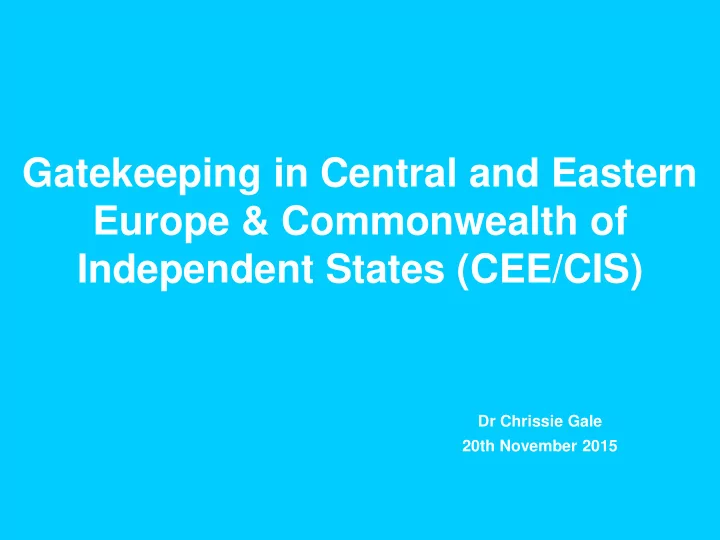

Gatekeeping in Central and Eastern Europe & Commonwealth of Independent States (CEE/CIS) Dr Chrissie Gale 20th November 2015
Gatekeeping • Prevention • Reintegration • Alternative family-type Care • Permanent family
A Framework for Gatekeeping • Sustained political will • An appropriate legal and regulatory framework • Well managed coordination • Adequate structures and processes for delivery of child protection services • A sufficient and capable work force • Access to quality alternative family type care
A Framework for Gatekeeping • Range of community based family support services – multi-disciplinary approach • Support for reunification of children from alternative care to parents or extended family • Permanent family • Data management and accountability mechanisms • Positive social attitudes and practices.
A Framework for Gatekeeping • Important to work within existing national coordination and networking system • Important to work with national government systems • The Ministry of Finance should be our best friend • We need to encourage donors to support sustained political will • Improve national data systems
Children without Parental Care Trends: A look at the trends in rates 2000 - 2009 2000 - 2013 Rate of children without parental care during the year ( TransMonEE 2015) 2000 2005 2007 2009 2011 2013 Armenia 9 48 27 33 24 Azerbaijan 34 33 29 29 33 41 Belarus 221 250 242 221 233 157 Georgia 30 73 - 117 109 52 Kazakhstan - 233 204 168 163 - Kyrgyzstan 133 148 129 128 138 94 Moldova 128 241 263 400 384 440 Russian Federation 362 462 456 404 311 253 Tajikistan - 120 174 160 72 65 Turkmenistan 2 4 Uzbekistan 57 70 69 65 70 64 Ukraine 197 242 275 228 194 165
A Framework for Gatekeeping • Important to not confuse - i.e. use of different tools and methodologies • Child care systems are not providing protection for children at risk • Need regional debate on informal care • Not enough focus on prevention of family separation • Not sufficiently addressing family reintegration
Why are Children Placed in Institutions? Reasons for the Reasons for the institutionalisation of institutionalisation of children below 3 years of age children below 3 years of age in Western Europe countries in Central and Eastern Europe countries parental abuse parental or neglect abuse or neglect orphans true orphans disability disability social reasons social reasons • Source: EU Daphné Programme (2004)
A Framework for Gatekeeping • Foster care is becoming ‘paid adoption’ - money follows the child does not necessarily work and quality of selection, training, support and monitoring is still poor – quota led • Research shows the benefits of small residential provision i.e. SGHs for certain children • Even if the numbers of children in large residential institutions are decreasing - not necessarily number of the children without parental care decreasing
A Framework for Gatekeeping • Pilots – not planned to scale up • We need to care for the carer • Need linkages with social policy and particularly with such issues as employment creation etc. • If we can only do one thing – we should invest in people • We need to listen more – especially to children
UN Guidelines • 2009 UN Guidelines for the Alternative Care of Children
Thank You
Recommend
More recommend